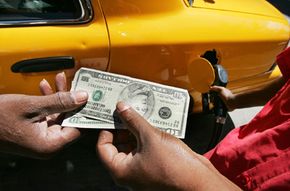You have a big expense coming up. You need a better car, or a bigger home, or you want to go back to college. What do you do? Borrow, borrow, borrow -- right? Well, maybe not.
Advertisement
If you've created a budget, you know exactly how much money you have coming in, and how much is going out. You can make some plans concerning that big expense. But if you don't have a budget plan, you probably don't have a very good picture of your finances, and you may be tempted to borrow more money rather than squeezing all you can from your income. It's definitely better in the long run -- for you and for your money -- to have a budget.
Creating a budget can be a frustrating task. Staying on budget can be even harder. Once you've created your budget, it's important to stick to it.
It's easy to understand how careful budgeting can improve a financial situation. And we all know that fewer financial problems mean less stress. But here's one of the best benefits: Working together on a budget can help your marriage. With money arguments being one of the largest causes of divorce, managing your budget can relieve financial stress on your marriage and make your life better all around.
But we know that always being practical, careful and responsible can be overwhelming. In this article, we'll explore 10 tips for staying on budget, without losing your sanity.
Read on to find ways to save money and prepare for a major purchase on a tight budget.

